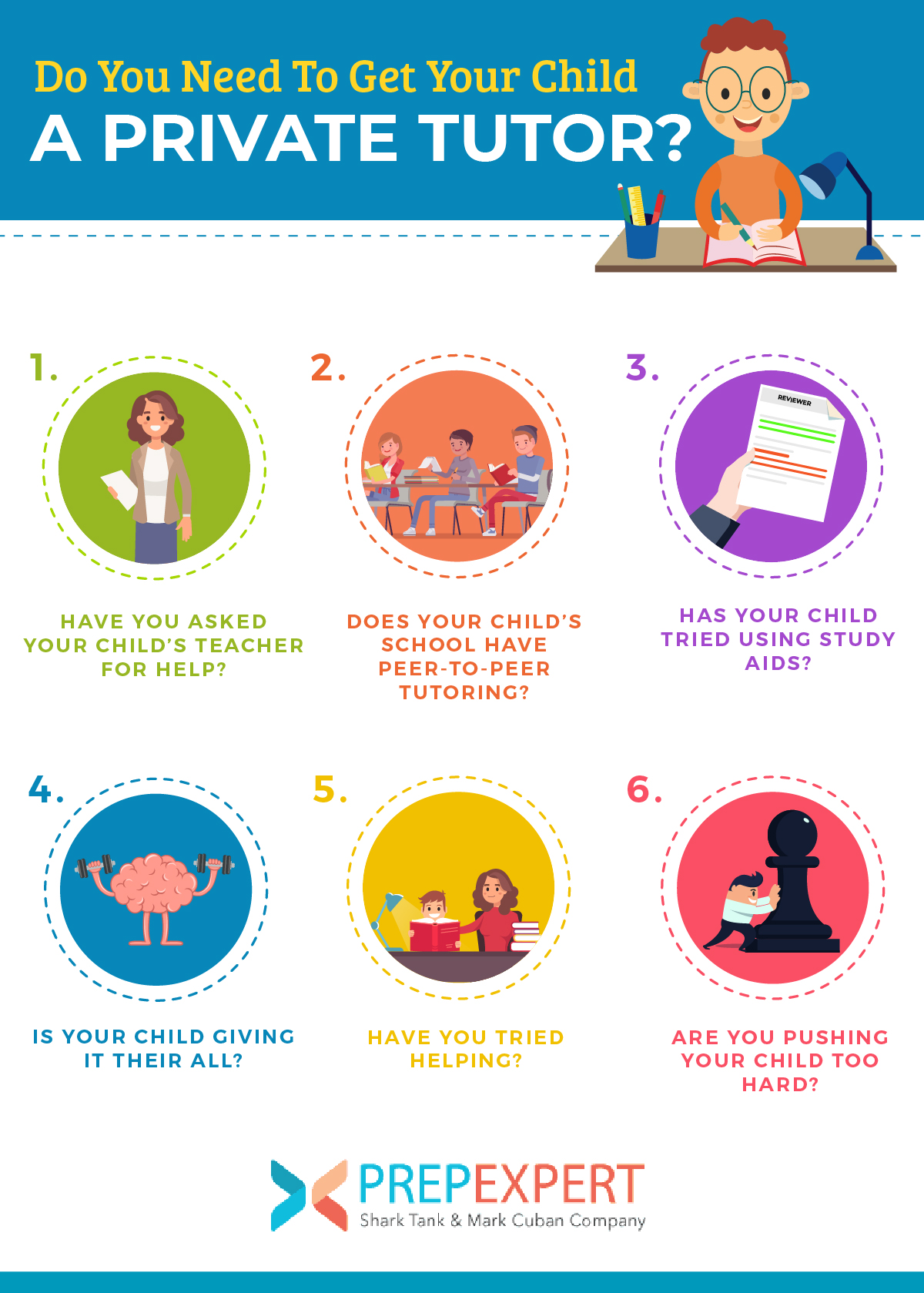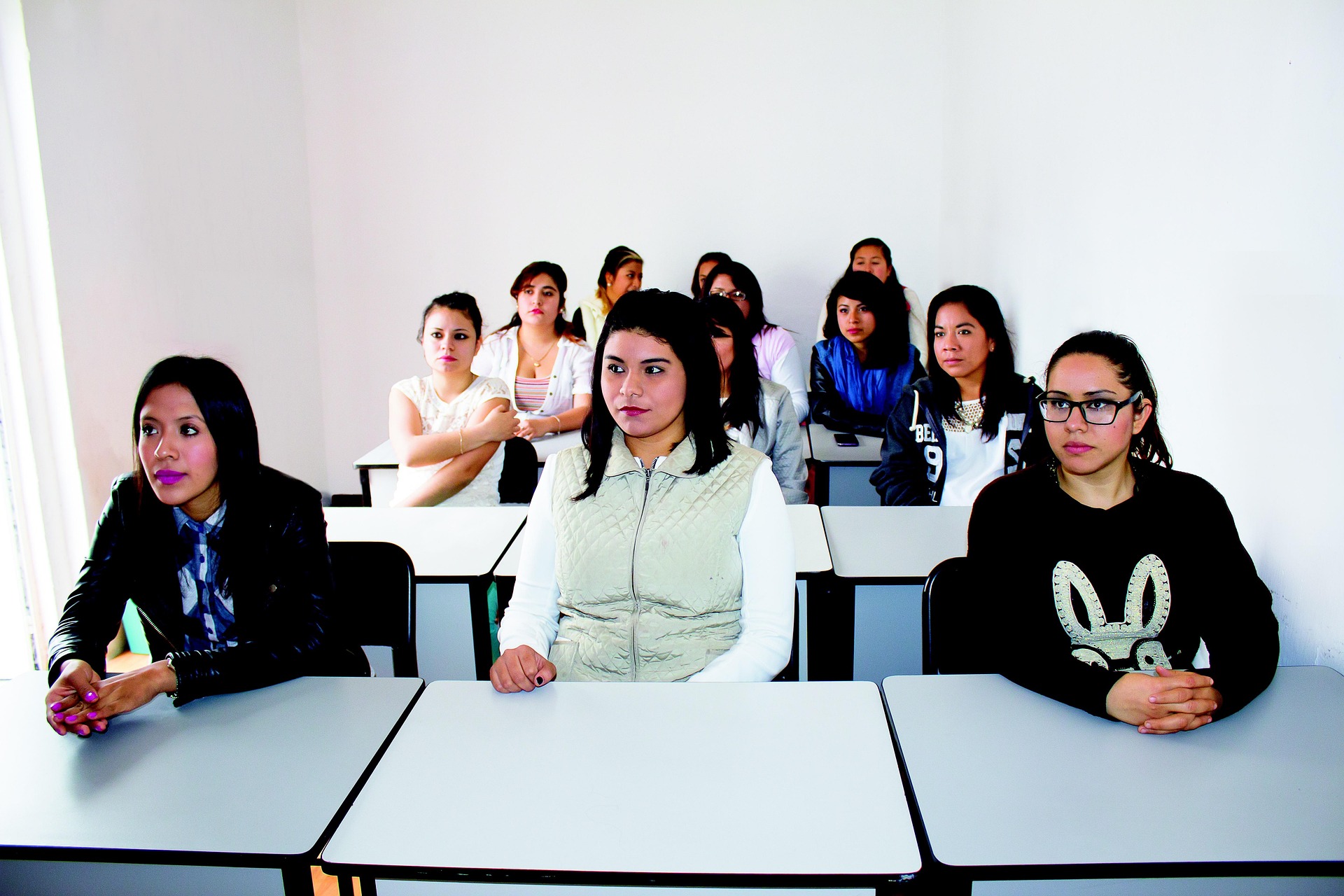Do You Need To Get Your Child A Private Tutor?
A private tutor could be a tremendous resource for your child, particularly for subject areas in which the child is struggling or has an especially demanding amount of schoolwork.
There are a variety of factors and other options you should consider before you go to the trouble and expense of engaging the services of a private tutor for your child.
More thoughts on these considerations below. If your child needs assistance with college entrance exams, consider signing him or her up for an SAT prep course or ACT prep course with Prep Expert®. Private tutoring is available as well.


Have You Asked Your Child’s Teacher For Help?
Your child’s teacher might be able to provide him or her with some extra help after class.
Have a conversation with your child’s teacher about getting your child some extra help after class. At many schools, after-hours assistance is mandatory and considered part of a teacher’s workload. However, even if this isn’t the case at your child’s school, many teachers are more than willing to provide their time and expertise outside of class hours to help struggling students.
Remember that teachers are busy people, and probably have more than a few other students they are spending extra time with after class, too. Before you meet with your child’s teacher, take care to identify exactly what your child needs to work on or spend more time studying, and use this information to come up with a study plan, so your child’s extra help time is well-spent.
For example, in geometry class, does your son need help with solving problems with right triangles or with circles? In English class, is your daughter having trouble writing persuasive essays or with literary analysis? In Spanish class, is your child having difficulty with verb conjugations or with vocabulary quizzes?
Identifying the precise areas your child needs to work on ahead of time will make things easier for the teacher, which will also leave the teacher with more time to work with your child on those problem areas.
When it comes to identifying your child’s areas of difficulty, the teacher will likely be able to provide some insight as well, but they need feedback from you and your son or daughter in order to provide your child with the most help.

Does Your Child’s School Have Peer-To-Peer Tutoring?
Other students at your child’s school might be able to provide him or her with extra help or tutoring.
In addition to after-school work with teachers, many schools have peer-to-peer tutoring programs, where advanced students help others with subject matter and schoolwork. Have your child ask at school about such programs. They are usually provided free of charge and held after school or on weekends.
If your son or daughter is a generally good student and just needs help with one particular class, he or she may be able to trade tutoring help with a classmate having trouble in another class. For example, if your son is a math whiz but struggles with history, there might be a student with the exact opposite problem whom he or she could tutor, and vice-versa. Ask your child if they know of a classmate they might be able to study with under this kind of arrangement.
If this sort of program isn’t currently available at your child’s school, talk with your child’s teachers or with other parents about getting one started, either through the school or informally.

Has Your Child Tried Using Study Aids?
You might be able to purchase a book or sign up for an online study program that will be exactly what your child needs to get a grip on whatever material they’re struggling with.
Check out your local Barnes & Noble, other bookstores, or Amazon.com for study aids in the area that your child is struggling with. There are loads of resources out there, usually, at very affordable prices, that might be more accessible and affordable than a private tutor.
As an example, for help with Advanced Placement (AP) courses, a great number of companies—Kaplan, Barron’s, Princeton Review, among others—put out books covering the entire courses, and offering advice and suggestions on various methods of study, as well as how to tackle particular types of exam questions.
Academic help websites such as Khan Academy also provide excellent, free resources for parents and students in a number of areas, from the subject matter and AP courses to college entrance exams, such as the SAT/SAT II and the ACT.
[leadmagnet_five]
Online reviews from other parents are a good way to check the efficacy of such books and programs. And your child’s teacher or other parents at your child’s school might be able to provide some recommendations, too. Just ask around.

Is Your Child Giving It Their All?
Be sure your child is putting in the proper effort.
If your child isn’t applying him or herself in class, a private tutor isn’t going to change things. Ask your child’s teacher if your child is putting enough effort into his or her studies. If the answer is no, this is the issue you need to address.
Ask your child why he isn’t making the effort in class. Is he not interested in the material? Explain to him that, despite his lack of enthusiasm for the subject matter, it’s still necessary to apply himself to maintain a good GPA for his college applications.
Perhaps your child is overwhelmed with work in her other classes and just doesn’t have the energy to give it her all in the problem class. If this is the case, it might be helpful to talk with your child’s teachers and discuss whether your child’s classwork and homework are too much. Maybe it would be appropriate for your child to move to a lower-level class (i.e., a non-Honors or -AP class) where the workload and difficulty would be less.
You should also consider sitting down with your child and setting a weekly work/study schedule—for example, in addition to regular homework assignments, devoting certain days to trouble areas in math or science, and still others to long-term projects and papers or exam prep. Getting more organized might just help your child get his or her studies back on track.

Have You Tried Helping?
Don’t forget, you might be able to help your child on your own.
If you have the time, see if you’re able to help your child out with his or her studies. It’s true—it’s been a long time since you were in high school, but it’s likely that anything your child is having difficulty with won’t be too difficult for you. Check out that math worksheet or history textbook and see if you’re able to help your student problem-solve or understand the Civil War more clearly.
Spending time with your child on their schoolwork would be a good time for you to check in with them on other aspects of their lives, too. Make a thing out of it—grab coffee and pastries together at Panera Bread every Tuesday and tackle trigonometry. Or find a room at the public library to study at a few hours, and then take a nice walk through the park on your way home. Bond!

Are You Pushing Your Child Too Hard?
Be sure your child isn’t struggling because you’re pushing him too hard.
High school students are some of the busiest and most overworked people out there—their schedules are filled with classes, extracurriculars, sports, test prep, college applications, after-school jobs, et cetera—and yet some parents expect their children to always be doing more.
Ask yourself if you’re not pressuring your child so much that they’ve taken on way too much and are struggling because there’s simply too much for them to handle. Not every child—scratch that, no child—is Superman, and just because you want to see him or her taking AP Chem, going out for the tennis team, and scoring 1600s on their SAT practice tests, doesn’t mean that they can, or should.
[leadmagnet_two]
If you suspect that you might be putting too much pressure on your kid, ask them if they feel this way. If they do, then work with them to lighten their load so they can put the right effort into the essentials, and still have a little time for themselves, too. If he or she is able to relax just a little bit, your child will have a chance to shine.

Maybe A Private Tutor Is A Good Decision
If you’ve done the above and determined a private tutor is necessary, ask around and do some research on your own to find a tutor who will be the right fit for your child.
The best people to ask for private tutor recommendations are other parents and teachers at your child’s school. Check online, too—and don’t just look at nationally-recognized companies like Kaplan. Most major cities have boutique agencies that offer private tutoring as well.
The right tutor for your child might be a smart college kid looking to make some extra cash. Or perhaps your child needs help from a professional tutor with an advanced degree in the subject matter area. Consider this carefully—the services of a professional tutor can be quite expensive, up to hundreds of dollars an hour.
Be sure your child and the tutor meet at least once to ensure a good fit before you hire the tutor on a long-term basis. Set a schedule with the tutor and outline your child’s needs, as well as your expectations, clearly. And be sure to check in with the tutor and your child from time to time to ensure things are going well.
For more test strategy, college admissions, and scholarship application tips sign up for our FREE class happening right now!
Written by Dr. Shaan Patel MD MBA
Prep Expert Founder & CEO
Shark Tank Winner, Perfect SAT Scorer, Dermatologist, & #1 Bestselling AuthorMore from Dr. Shaan Patel MD MBA

What Kind of SAT Score Gives You a Good Chance at a Scholarship in 2026?
As more colleges remain test optional, students often assume standardized test scores no longer matter for scholarships– but that’s a…

ACT Scores and Scholarships: Where To Look and What To Know
In the USA, outstanding student loan debt totals almost $145 billion. To put that in perspective, if American student loan…

From Test Anxiety to “I’ve Got This”: How Prep Expert® Students Build Real Confidence Before SAT & ACT Day
Confidence is one of the most underrated score boosters on the SAT, PSAT, and ACT. Students can know the content…